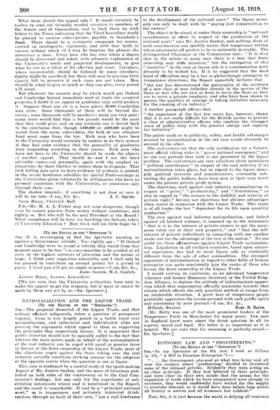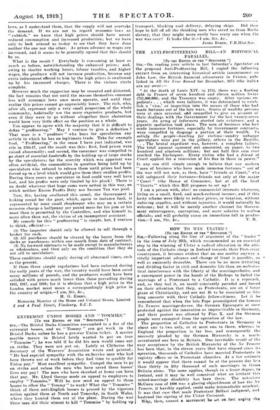ECONOMIC LAW AND "PROFITEERING." [To THE EDITOR Or THE "
SPECTATOR."] Sin,—In my Spectator of the 9th inst. I read as follows (p. 171, " A Bill to Paralyse Enterprise "):—
" . . . the Government, alarmed at what was being said all over the country about 'profiteering,' decided to • re-control some of the released articles. Evidently they were acting on no clear principle. If they had believed in their principle, and were clear in their own minds that the means for the expansion of trade which we have enumerated were already in existence, they would confidently have waited for the supply to overtake demand, as it would have done before long unless all history is untrue and all economic law rubbish."
Now, Sir, it is just because the world is defying all economic laws, as I understand them, that the supply will not overtake the demand. If we are not to regard economic laws as " rubbish," we know that high prices should have meant reduced consumption and increased production; but we have only to look around us to-day to see that they have done neither the one nor the other. As prices advance so wages are increased, and it seems to be generally agreed that this should be so.
What is the result ? Everybody is consuming at least as much as before, notwithstanding the enhanced prices; and, owing to shorter working hours, labour troubles, and higher wages, the producer will not increase production, because any extra inducement offered to him by the high prices is swallowed up by his increased charges. There is the vicious circle complete.
However much the suggestion may be resented and distorted, the fact remains that not until the masses themselves consume less will economic laws once more operate, and until they realize this prices cannot go appreciably lower. 'rite rich, who, after all, represent only a very small proportion of the whole community, habitually use the more expensive products, but even if they were to go without altogether their abstention would have very little effect on the position as a whole.
You appear to agree with the majority that it is difficult to define " profiteering." May I venture to give a definition ? That man is a "profiteer " who buys for speculation any article in which he has no legitimate trade-. Take for example food. "Profiteering," in the sense I have just indicated, was rife in 1916-17, and the result was this: first, food prices were raised abnormally; and .second, the consumer was compelled to go short of essential foodstuffs by the holding up of large stocks by the speculators; for the scarcity which was apparent was often artificial, the commodities in question being held up by &peculators who refused to release them until prices had been forced up to a level which would give them their swollen profits. During these years no speculator in food could very well have lost, and his profits were only limited by his pluck! There is no doubt whatever that huge sums were netted in this way, on which neither Excess Profits Duty nor Income Tax was paid.
Now, Sir, having swallowed this camel, the Government is looking round for the gnat, which, again to instance food, is represented by some small shopkeeper who may on a certain occasion charge a halfpenny per pound more for his jam or his moat than is permitted by the Controller, and who himself is, more often than not, the victim of an incompetent assistant.
My remedy for this " profiteering " is simple, but, I venture to think, efficient :- (1) The importer should only be allowed to sell through a broker for cash.
(2) All purchases should be cleared by the buyer from the docks or warehouses within one month from date of contract.
(3) No forward contracts to be made except to manufacturers or wholesalers, and then only on the condition that they do not sell to speculators.
These conditions should apply during all abnormal times, such as the present.
If these three simple regulations had been enforced during the early years of the war, the country would have been saved many millions of pounds, and the producers would have been satisfied with prices much lower than those prevailing during 1916, 1917, and 1918; for it is obvious that a high price in the London market must mean a correspondingly high price in the country of origin.—I am, Sir, &c.,
H. G. EMERY, Managing Director of the Home and Colonial Stores, Limited. 2 and 4 Paul Street, Finsbury, E.C.2.



































 Previous page
Previous page